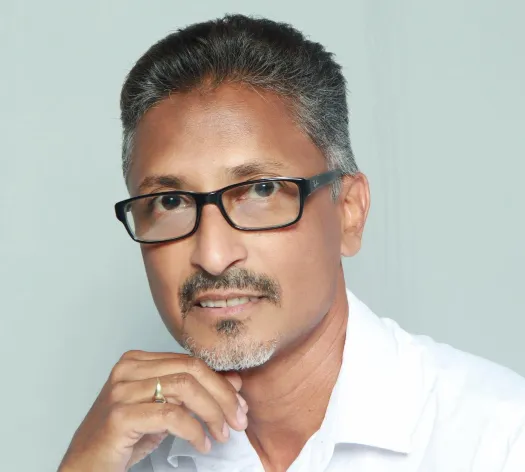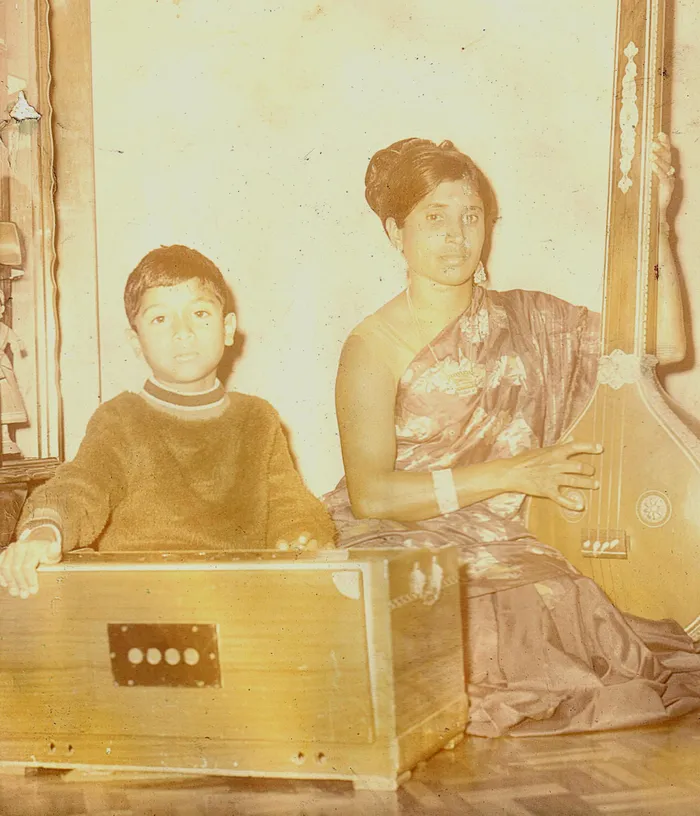
Tansen Nepaul
Image: Supplied
AS TANSEN Nepaul celebrates his 60th birthday, his legacy as a trailblazer in the South African music scene continues to inspire, reminding us all of the power of passion and dedication in the face of adversity.
The seasoned musician and media professional reflected on a rich career that has spanned over three decades, profoundly impacting the local Indian community and the wider music industry.
His journey from humble beginnings in Merebank to becoming the station manager at Southside FM serves as an inspiring tale of perseverance and dedication to the craft.
Nepaul was introduced to the world of music at age 4 when he accompanied his mother, Subuluxmi Naidoo, a renowned singer, during a performance.
Under the mentorship of his father, Madhanjith Nepaul, Tansen Nepaul immersed himself in the sacred ragas of Hindustani music, beginning a lifelong passion for music that would see him collaborate with renowned artists and bands, including the Lingham Orchestra and Suhana Sungeet, ultimately establishing his own band, the Tansen Nepaul Showband.

With his late mom, Subhuluxmi Naidoo.
Image: Supplied
Reflecting on his formative years, Nepaul, of Reservoir Hills, said: “My father, who was a musician and vocalist, was a student of the late Pundit Sultan Khan. I later studied Western music on the piano under Eric Harris, followed by Chin Pillay, who taught me South Indian orchestral music.”
He further honed his skills by studying Carnatic music under Harry Arunachalan, allowing him to accompany prominent artists.
“This was my real learning experience," he reminisced.
"I was regularly featured in Dr TP Naidoo’s Indian Academy concerts, which was the platform that introduced me to mainstream of Carnatic concerts."
A turning point in his music career was when he joined the Radio Lotus resident band, Kamal Sungeet, where he worked with artists throughout South Africa.
He said local music was never taken seriously in those days due to the vast difference in what Indian South African musicians produced compared to what India was producing.
"It became my ambition to close this gap with professional production techniques using the artists we had available. Working with talented musicians with the same professional vision brought about change and we were soon performing at high profile events and were sought after and respected by people from varying economic backgrounds."
However, his true passion, he said, lay in music production technology.
He pursued electronic engineering at ML Sultan Technikon and the educational path ultimately proved instrumental in shaping his iconic music career.
"I started my career at the SABC in 1989. The position was for a junior technical producer for radio stations at the national broadcaster. This was the start of many doors that opened later on in my life.
"In those days most after-hours programmes were pre-recorded for later playback. This involved many hours of work in isolated studios with no lunch breaks. I later went through many technical courses offered by the SABC’s in-house training programmes in Johannesburg, and I became the first Indian at the SABC to study music production."
However, being in Johannesburg for the in-house training, he said, gave him a taste of reality.
"We were still in the days of apartheid and my first taste of segregation was when I was not allowed to stay in the SABC residence like my other colleagues even though I had a confirmed booking.
"The SABC residence booking office initially did not know that Nepaul was an Indian surname and realised their mistake when they saw this small brown man arrive with his huge bags. I then had to book into a hotel for non-whites, which was a 40 minutes’ walk to the SABC in Auckland Park as there was no public transport available to me.
"But even this turned out beneficial. I was paid for two months' accommodation according to the SABC’s tariff policy and this was three times more than the cost of the seedy hotel I stayed in. With the money to spare, I went to music shops and bought musical equipment that I really needed but could never afford.”
This unfortunate incident had actually helped propel his music career as he had gained the equipment he desperately needed.
He said he ended up being part of the Radio Lotus resident band and simultaneously worked as a production assistant. After completing his music production course, he was allowed to use the music studios. Within a year, he had won the SABC’s Arties Award for music production against established stalwarts in the industry.
This, said Nepaul, started a new chapter in South African Indian music.
"Fakir Hassen, the then manager of Radio Lotus, saw fit to motivate for me to move to the station as a resident music producer. This became a significant intervention in increasing South African Indian music content at the time.
"The Radio Lotus song competition was the most significant attempt at producing original music and it was here that my composing talents had come to the fore. Together with Ramu Gopidayal, who was executive producer of Impressions, which was an SABC programme that highlighted the local Indian community, we managed to produce local music of a high standard that made the community proud of our talent."
Radio Lotus, under the leadership of Khalik Sherrif, promoted Nepaul to programmes executive and enrolled him in courses that were available, including management and business.
With Sherrif, Vimla Frank and Tansen Nepaul at the helm of the station, a concerted marketing drive was initiated. The station also rebranded from Radio Lotus to Lotus FM where they had reached a peak listenership of 800 000.
"After 10 years at Lotus FM, my previous manager, Dhanraj Ajodapersadh, of Radio Broadcast Facilities, wanted my skills back at the SABC’s technical department. He gave me an undertaking that I could simultaneously continue with my music production as the studios belonged to his department.
"I continued as the principal technical producer at the SABC involved in all aspects of broadcasting until 2021 when the broadcasting giant started to wield its heavy-handed sword on its staff as part of its restructuring process. The offer to remain was not at all attractive, so I decided to part ways with the SABC."
Nepaul said leaving was a daunting task because he had not considered or planned for early retirement.
"However, the support of close family and friends made this step so much easier. I am grateful that after 32 years, the SABC had given me enough skills to continue in life."
In 2022, businessman Karthy Moothsamy approached him to take on the position of station manager at Southside FM, a community radio broadcaster targeting the South Indian community.
“Keeping the station alive is what takes up most of my time but I enjoy the challenge and see the benefit of such a station in the community."
He said he would dedicate the next few years to see the station become financially independent and reiterated that this could only happen with the help of the business sector and the community at large.
"I will then look at new ventures to remain relevant and beneficial to society."
Nepaul is married to vocalist Umita Kishore Nepaul and they have two children - Bihaag Nepaul, 24, a qualified software developer, and Himani Nepaul, 19, a first year BCom student.
His hobbies are music, electronics and he enjoys sitting quietly in his workshop repairing anything that is broken.
Related Topics: